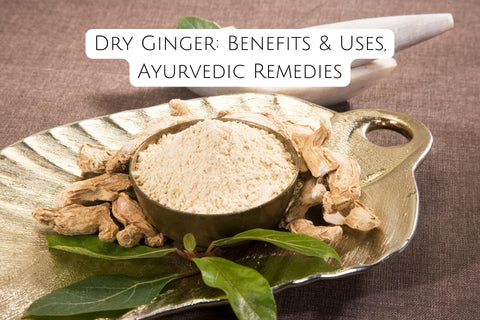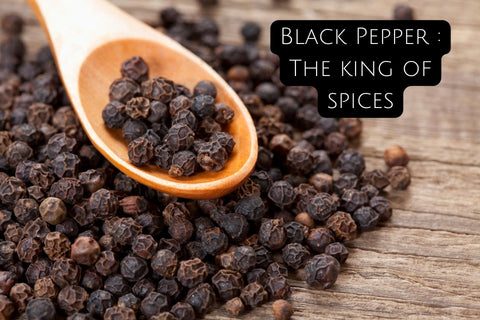Dry ginger, also known as dried ginger or ground ginger, is a popular spice derived from the rhizome of the ginger plant (Zingiber officinale). Dry ginger, also known as saunth or sunthi, is the dried and powdered root of the ginger plant. It has a stronger flavor and aroma than fresh ginger, and it is longer shelf-stable. Dry ginger is often used in Indian cuisine, as well as in traditional medicine.Ginger is a flowering plant native to Southeast Asia.
Benefits of Dry ginger:
Dry ginger, also known as saunth or sunthi, is the dried and powdered root of the ginger plant. It has a stronger flavor and aroma than fresh ginger, and it is longer shelf-stable. Dry ginger is often used in Indian cuisine, as well as in traditional medicine.
Relieves nausea and vomiting:
Dry ginger is a popular remedy for morning sickness, motion sickness, and chemotherapy-induced nausea.
Improves digestion:
Dry ginger can help to speed up digestion and relieve indigestion and gas.
Reduces inflammation:
Dry ginger contains complex compounds that have anti-inflammatory properties. This may make it helpful for manage conditions such as arthritis, asthma, and inflammatory bowel disease.
Boosts immunity:
Dry ginger contains antioxidants and other compounds that can help to boost the immune system and fight off infection.
Reduces pain:
Dry ginger may help to reduce pain associated with headaches, migraines, and menstrual cramps.
May help with weight loss:
Some studies have shown that dry ginger may help to promote weight loss and reduce body fat.
Uses of dry ginger
Dry ginger, also known as dried ginger or ground ginger, is a versatile spice with various culinary and medicinal uses. Here are some common uses of dry ginger:
Culinary Uses:
Flavoring Agent: Dry ginger is used as a spice to add flavor and aroma to a wide range of dishes, including soups, stews, curries, and marinades.
Baking: It is a key ingredient in baking, especially in recipes like gingerbread cookies, ginger snaps, and ginger cakes.
Spice Blends: Dry ginger is a component of many spice blends, such as curry powder, garam masala, and pumpkin spice mix.
Tea: Dry ginger can be steeped in hot water to make ginger tea, which is a popular and soothing beverage known for its potential health benefits.
Pickles and Chutneys: It is used in the preparation of pickles and chutneys to enhance their flavor.
Medicinal Uses:
Digestive Aid: Dry ginger is used to relieve digestive issues like indigestion, bloating, and nausea. It can also be consumed to promote healthy digestion.
Anti-Inflammatory: It has anti-inflammatory properties and is used to reduce inflammation in the body, which can help alleviate various ailments.
Cold and Flu Relief: Dry ginger is often used in home remedies to soothe symptoms of the common cold and flu. It can help alleviate congestion and sore throat.
Menstrual Pain: Some people use dry ginger to alleviate menstrual pain and discomfort.
Motion Sickness: It can be used to reduce motion sickness and nausea during travel.
Arthritis and Joint Pain: Dry ginger may help alleviate pain and inflammation associated with conditions like osteoarthritis.
Herbal Preparations:
Dry ginger is a common ingredient in traditional herbal medicines and Ayurvedic remedies.It is used in various herbal formulations and decoctions for its therapeutic properties.
Flavor Enhancer: Dry ginger can enhance the flavor of beverages like hot chocolate, smoothies, and cocktails.It is used as a seasoning for some fruits, like apples and pears.
Cosmetic and Toiletry Products: Dry ginger is used in the production of perfumes, soaps, and cosmetics due to its pleasant aroma.
Potpourri and Aromatherapy:The aromatic qualities of dry ginger make it suitable for use in potpourri and aromatherapy.
Preservative: In some cuisines, dry ginger is used as a natural preservative for certain dishes.
Home Remedies: People often use dry ginger in home remedies for a variety of health concerns, including sore throat, cough, and digestive discomfort.
It's important to note that the usage of dry ginger can vary across cultures and cuisines. When using dry ginger in cooking or for its potential health benefits, it's essential to follow recipes and recommended dosages to ensure safety and the desired flavor or therapeutic effect.
Ayurvedic remedies of dry ginger
Ginger Tea (Adrak Chai):
- Ayurvedic ginger tea is a popular remedy for digestive issues and colds.
- To make it, add a small piece of dry ginger (about half a teaspoon of powdered ginger) to boiling water along with tea leaves or herbal tea bags.
- You can also add honey and a squeeze of lemon for added flavor and benefits.
Ginger Decoction (Sonth Kwath):
- This decoction is used to alleviate colds, congestion, and fever.
- Boil a small piece of dry ginger in water until the liquid reduces to about half its original volume. Strain and drink it warm.
Ginger and Honey Paste (Adrak Leham):
- This remedy is used for respiratory issues and to boost immunity.
- Mix powdered dry ginger with honey to form a thick paste. Consume a small amount daily to relieve cough and cold symptoms.
Ginger Water (Sonth Vatari):
- Used for reducing joint pain and inflammation, this remedy involves soaking dry ginger in water overnight and drinking the infused water the next morning.
Ginger and Turmeric Paste (Sonth-Haldi):
- A combination of dry ginger and turmeric is used as an anti-inflammatory paste to relieve joint pain and swelling.
- Mix equal parts of dry ginger powder and turmeric powder with water to create a paste. Apply it to the affected area and wash off after some time.
Ginger and Rock Salt (Saindhava Lavan):
- This simple remedy can be used for digestive issues.
- Mix dry ginger powder with a pinch of rock salt and consume it with warm water after meals to aid digestion.
Ginger and Jaggery (Adrak Gud):
- To alleviate menstrual pain, dry ginger is sometimes mixed with jaggery.
- Make a paste by combining powdered dry ginger and jaggery, and consume it during the menstrual period.
Ginger Oil (Sonth Taila):
- Ginger-infused oil can be used for massage to relieve muscle and joint pain.
- Warm the ginger oil and massage it into the affected area to promote blood circulation and reduce pain.
Ginger Inhalation (Sonth Pranayam):
- Inhaling steam from hot water infused with dry ginger can help clear congestion and relieve respiratory discomfort.
- Add dry ginger powder to a bowl of hot water, lean over it with a towel covering your head, and inhale the steam.
In conclusion, dry ginger, derived from the rhizome of the ginger plant and ground into a fine powder, is a versatile spice with a wide range of culinary and medicinal applications. Its unique flavor, aroma, and potential health benefits make it a popular ingredient in various cuisines and traditional healing practices.




Comments (0)
There are no comments for this article. Be the first one to leave a message!